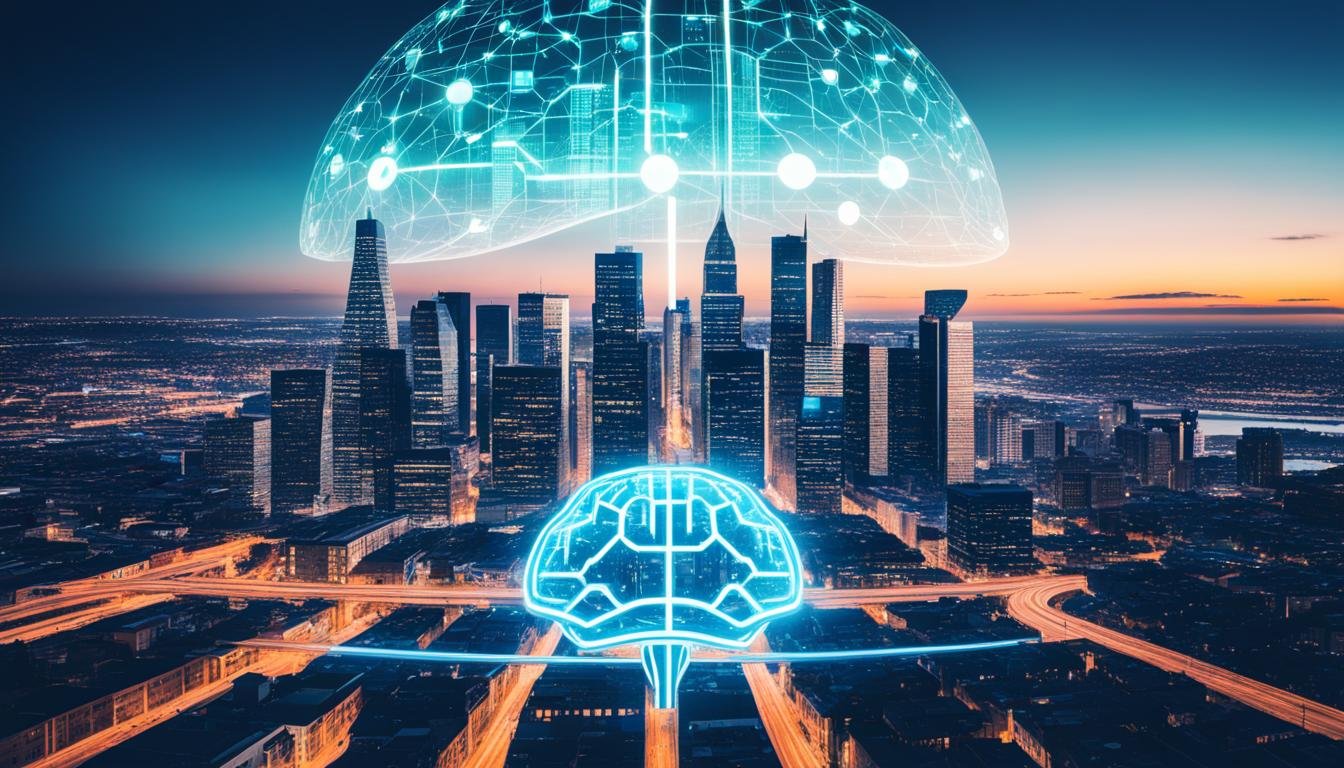Over 1,000 leaders, innovators, and problem-solvers have joined AI for Good events. They show how AI can change the world for the better. With new tech like ChatGPT-4 and Google’s Bard, it’s clear AI can make a big difference in our lives.
Yes, there are worries about AI’s misuse. But, this tech also brings many benefits. It can make our lives better in big ways. For example, it can make work easier, boost productivity, and change fields like education and healthcare for the better.
Key Takeaways
- AI has the potential to positively impact 135 targets across the UN Sustainable Development Goals
- AI can streamline organizational processes, boost worker productivity, and improve job satisfaction
- AI is transforming industries like education, healthcare, and disaster management for the better
- AI can help reduce errors, make smarter decisions, and improve overall efficiency
- AI for Good initiatives are bringing together leaders and innovators to leverage this technology for social good
The Role of AI in Achieving the UN Sustainable Development Goals
The United Nations Sustainable Development Goals (SDGs) aim for a better future. Artificial intelligence (AI) can greatly help reach these goals. It can analyze lots of data, spot patterns, and make accurate predictions. This can speed up progress towards a fair, strong, and green world.
AI’s Potential to Positively Impact SDGs
AI is making a big difference in many areas. It helps use energy better, improves health care, and tracks nature. It also opens more doors for education. A study in the journal Nature says AI can help with 135 goals across all SDGs.
Addressing Challenges and Ethical Concerns
AI’s benefits for sustainable development are huge, but there are big challenges and ethical worries. It could take jobs, widen the digital gap, and spread bias and false info. It’s key to make sure everyone can use AI tools and get good data and computing power.
To make the most of AI for sustainable development, we all need to work together. Governments should invest in digital tech, support new businesses, and use data wisely. They should also train workers. Making sure data is diverse and AI models are transparent is vital for ethical AI.
As we move towards a sustainable future, AI’s role in reaching the UN Sustainable Development Goals is huge. With careful leadership, teamwork, and tackling challenges, AI can be a big help. It can lead us to a fair, strong, and green world.
AI for Enhancing Productivity and Job Satisfaction
AI is changing the way we work, making tasks easier and boosting productivity. Tools like ChatGPT can make workers up to 14% more productive. They also improve customer happiness and cut down on the need for bosses to step in. Plus, they help keep employees on the job longer.
AI helps by finding and automating boring tasks. This lets workers do more important work, making them happier. In fact, almost 60% of those using AI feel more satisfied with their jobs.
Streamlining Organizational Processes
Companies use AI to make work smoother by taking over simple tasks. A recent survey found 30% of leaders say AI is making a big difference in their work. And 69% of leaders with a strong AI presence see their teams working more efficiently.
Strengths-based Interventions and Job Crafting
Experts in positive psychology are using AI to help with workplace wellness. AI can track what employees achieve and remind managers to give praise. It also helps workers pick projects that match their strengths, making their jobs more enjoyable.
By using AI with tools like the VIA character strengths survey, workers can find their strengths. This leads to higher job satisfaction and a happier workplace.
| AI Application | Impact |
|---|---|
| Automating repetitive tasks | Increased worker productivity by up to 14% |
| Tracking employee achievements | Elevated job satisfaction among 60% of AI users |
| Providing strengths-based feedback | Fostering a more positive work environment |
As AI gets better, companies that use it will get ahead. They’ll work better, make employees happier, and build a strong team ready for the future.
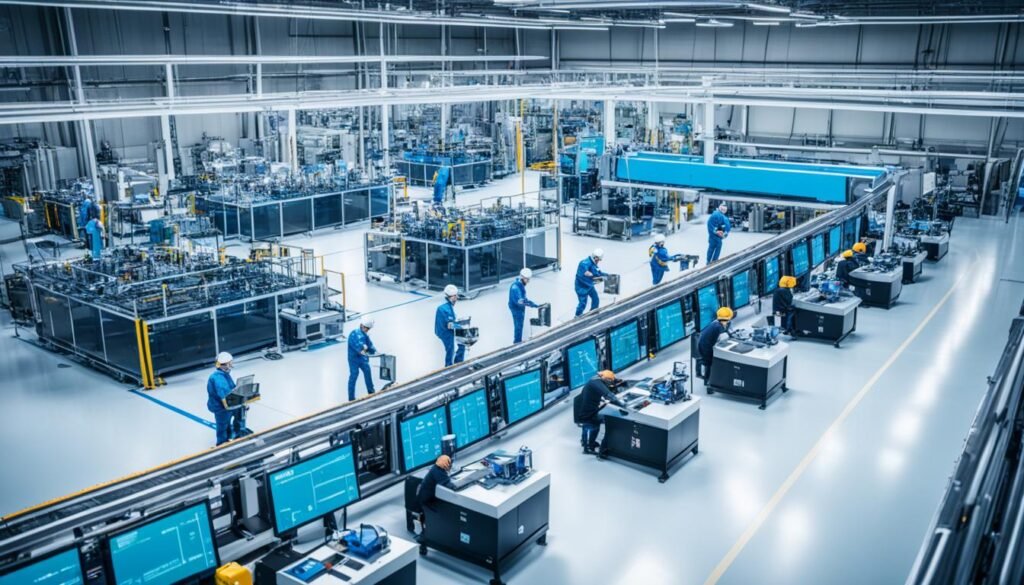
“Businesses are utilizing AI to enhance productivity by automating repetitive tasks and allowing employees to focus on more complex operations.”
AI and Automation: Improving Efficiency and Quality
AI has changed the game for businesses looking to boost productivity and efficiency. It takes over the boring tasks, letting companies focus on big plans. The global AI market is expected to grow by up to 54% each year, showing its huge potential.
AI-powered automation makes products better. For example, robotic surgery systems cut down on human mistakes in healthcare. People work well for only about 3 to 4 hours a day. AI, on the other hand, works all the time, offering consistent quality.
AI is not just about making things faster. It’s also solving big problems in many areas. Like finding breast cancer early or making self-driving cars. In hiring, AI helps make decisions without bias, making sure everyone gets a fair shot.
In manufacturing, robots do the repetitive work like welding and packaging. This means more products made faster and less waste. Deep learning techniques could add $3.5 trillion to $5.8 trillion in value each year.
The rise of AI and automation is changing the job market. While some jobs might disappear, many new ones will be created. By 2030, 21 percent to 33 percent more people (555 million to 890 million) might need new jobs. Companies that adopt these technologies will lead the way to a better future.
“AI and automation have the power to revolutionize how we approach productivity, efficiency, and quality in the workplace. By harnessing the capabilities of these technologies, we can unlock new avenues for growth and innovation.”
AI for Smarter Decision-Making and Data Analysis
In today’s world, AI is becoming a key tool for better business decisions and data analysis. It helps by making data delivery faster, ensuring consistency, spotting trends, and giving accurate forecasts. This leads to smarter, more informed decisions.
Leveraging AI for Research and Development
AI can quickly go through and understand big datasets, changing the R&D process. By speeding up data analysis, AI uncovers insights, finds patterns, and solves complex problems faster. This leads to more innovation and better problem-solving in companies.
PwC’s report says AI could boost the global GDP by up to 14% by 2030. North America and China will likely make up about 70% of the AI economic impact. These numbers show how big a role AI can play in changing businesses and boosting the economy.
| AI Application | Impact |
|---|---|
| Predictive analytics | Improved forecasting and planning |
| Automation of data processing | Increased efficiency and productivity |
| Anomaly detection | Identification of potential issues and risks |
| Personalized recommendations | Enhanced customer experiences |
As companies use more AI for decision-making and data analysis, they’ll see big gains in efficiency, R&D, and overall performance.
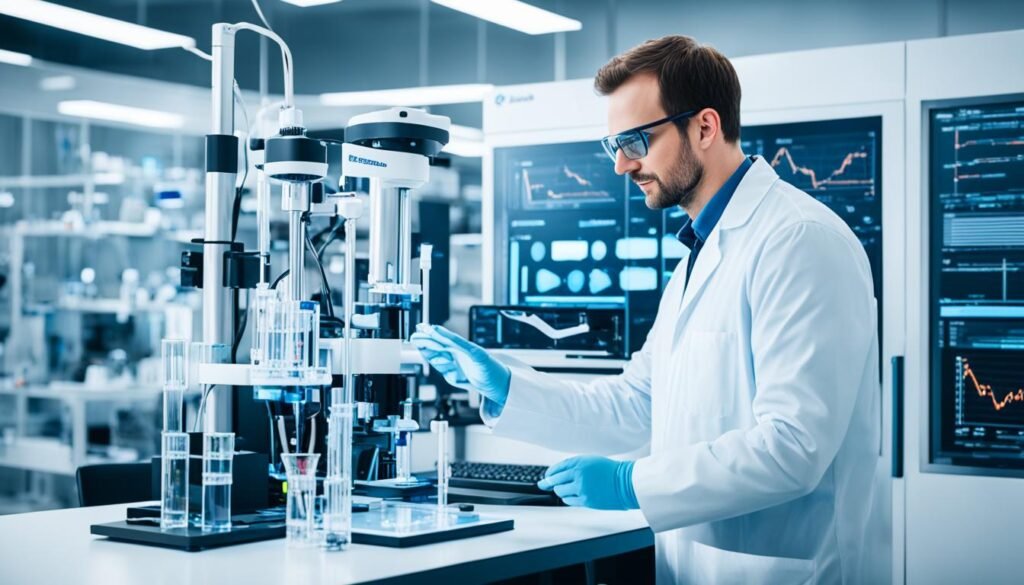
why ai is good for society
Addressing Complex Problems with AI
AI has made huge strides from simple machine learning to advanced deep learning. This has let us solve complex problems in many areas. It helps businesses and groups find solutions to many challenges. By using AI, industries can work better, spend less, and do more, helping everyone.
Reducing Errors and Improving Consistency
AI is great at cutting down on human mistakes. Tools like Robotic Process Automation take over tasks like data entry. This makes systems run smoother and less prone to errors. It’s super useful for businesses where mistakes can’t happen.
A survey by Forbes found many Americans trust humans over AI in some areas. But, AI is making life better for people with disabilities, the elderly, and kids in rehab. It’s making daily life easier for many.
Big language models (LLMs) are making tech more interactive, helping with brainstorming and chatting. In construction, AI is boosting productivity, safety, and green practices. It’s also saving time and lives by reducing human errors.
The future will see us working with AI a lot, just like we use email now. AI has already changed many areas, like making surgery more precise and education more personalized. As AI keeps getting better, its benefits for society will too.
AI in Education: Transforming Teaching and Learning
AI is changing how we teach and learn. It lets schools give personalized learning experiences to each student. This is thanks to AI in education.
AI-powered personalized education changes learning to fit each student’s style and speed. AI tools look at how students do and find what they don’t know. Then, they change the lessons and materials to help each student succeed.
Enhancing the Teaching and Learning Process
AI is also changing what teachers do. With AI-powered tools, teachers don’t have to grade papers or make presentations. This lets them focus on planning lessons and talking directly with students.
Also, AI-driven curriculum planning and development gives teachers insights and advice. It looks at trends, student data, and learning gaps. This helps teachers keep improving their teaching to meet their students’ needs.
| Benefits of AI in Education | Percentage of Educators Utilizing AI |
|---|---|
| Personalized learning experiences | 60% |
| Streamlined administrative tasks | 65% |
| Adaptive curriculum planning | 55% |
As more schools use AI in education, we’ll see big changes in teaching and learning. This will lead to improved learning outcomes and more engaged students.
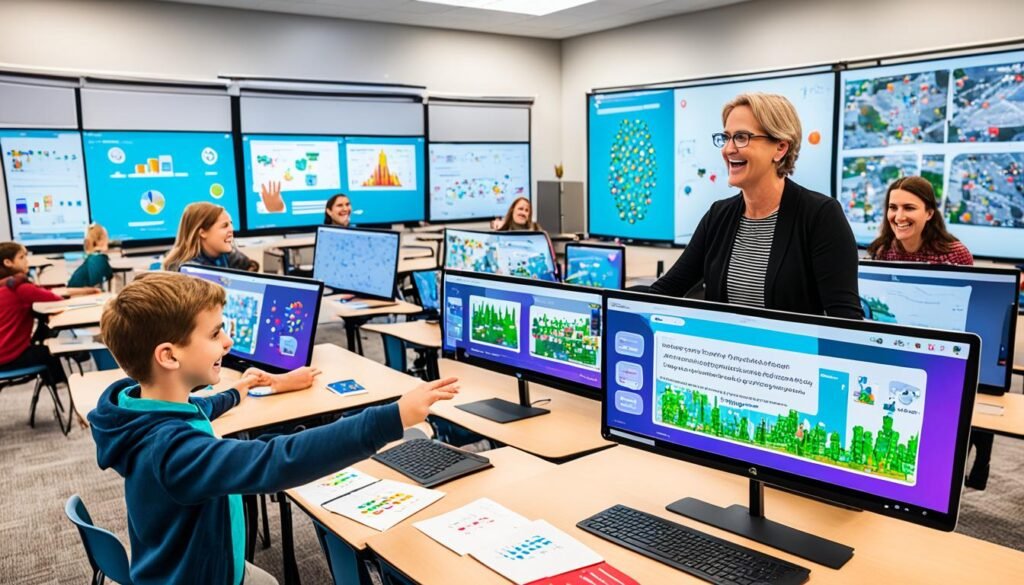
AI in Healthcare: Improving Diagnostics and Treatment
The healthcare industry is changing fast with AI. AI systems are making medical diagnostics and treatment better. They look at lots of patient data to find patterns and make predictions. This helps doctors make better decisions and give care that fits each patient.
AI is a big help in making medical diagnoses better. It can look at things like X-rays and MRIs very accurately. It can spot early signs of diseases like cancer and COVID-19 better than humans. This means doctors can start treating patients sooner, which can make a big difference.
AI is also changing how treatments are planned. It looks at a patient’s health history and other info to suggest the best treatment. This way, treatments can be more effective and have fewer side effects. Patients are happier with their care.
AI is also making things like filling out forms and updating records easier. It does these tasks automatically, so doctors can spend more time with patients. This makes doctors happier and helps them work better.
But, there are big questions about using AI in healthcare. We need to make sure it’s used right and that patients’ data is safe. We must make sure AI is used in a way that’s fair and open.
“AI has the potential to revolutionize healthcare, but it must be implemented with a focus on patient-centric care and ethical considerations.”
As AI becomes more common in healthcare, we’ll see big improvements. Patients will get better care, treatments will be more tailored, and things will run smoother. AI can help doctors give better care, use resources wisely, and shape the future of healthcare.
AI and Disaster Management: Accurate Forecasting and Preparedness
With the climate changing, predicting weather and disasters is key to managing disasters well. AI is changing this by giving us new insights. It’s changing how we get ready for and deal with natural disasters.
AI uses lots of data from weather stations and satellites to make better forecasts. It looks at patterns to guess when and where disasters might happen. This includes hurricanes, floods, and wildfires.
Predicting Natural Disasters and Weather Events
IBM and The Weather Company have teamed up to improve weather prediction and disaster readiness. IBM’s Watson looks at a lot of weather data quickly. This helps predict where hurricanes and other extreme weather will go.
Google’s AI system in places like India and Bangladesh predicts floods and alerts people early. AI has even spotted COVID-19 outbreaks before they were announced. This shows how powerful AI can be in disaster management.
AI gives us better and faster info, helping farmers, businesses, and communities make smart choices. This leads to safer, more efficient, and resilient communities. As AI gets better, it will have an even bigger impact on disaster management.
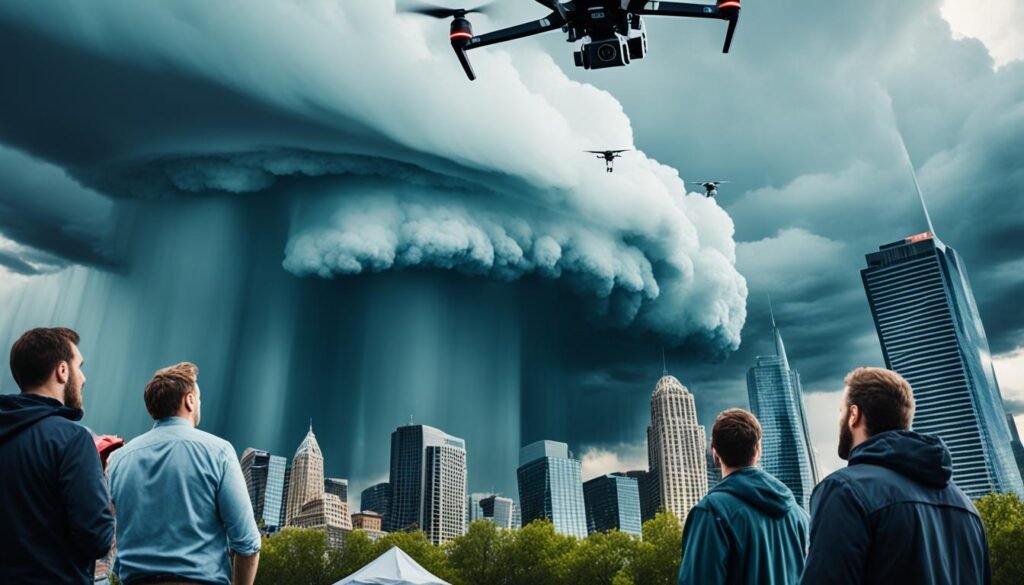
AI for Sustainable Development and Environmental Protection
Artificial Intelligence (AI) has a huge role in helping us live more sustainably and protect the environment. It uses advanced data analysis and predictive capabilities to tackle big environmental issues. These include climate change and managing resources better.
AI can make a big difference by making us use energy smarter. It looks at how we use energy, finds ways to use less, and makes changes to save more. This helps cut down on energy use and carbon emissions, making our planet greener.
AI is also changing how we handle waste. It uses robots to sort recyclables better, making recycling more efficient. Plus, AI helps turn waste into energy, which is good for the planet.
AI is also key in protecting nature and its creatures. It looks at data to understand changes in nature. This helps us act fast to save endangered animals and their homes.
AI for sustainable development touches many areas like farming and disaster management. It helps farmers use resources better, reduce waste, and grow more food. AI also helps communities get ready for and deal with natural disasters.
But, using AI for sustainability comes with its own problems. We need to think about energy use, privacy, and biases in AI. Making sure AI is used right is important for a sustainable future.
“AI has the power to revolutionize the way we approach sustainable development, but we must do so with great care and consideration for the planet and its people.” – [Expert Name], Sustainability Researcher
As we connect more, the importance of AI in environmental protection and sustainable development will keep growing. With AI, we can find new ways to manage resources well and create a greener, stronger future for everyone.
Conclusion
AI brings many benefits to society. It makes work more efficient and helps people do their jobs better. It also changes fields like education, healthcare, and disaster response for the better.
By using AI wisely, we can make our future better. We can work towards a world that is more sustainable, efficient, and fair for everyone.
As AI gets better, we must use it to solve big global problems. This means governments need to support AI development and teach it in schools. This way, we can use AI to make life better for everyone.
AI can make things more efficient, improve healthcare, make us safer, offer personalized services, and spark new ideas. If we use AI right, it can help everyone, not just make work easier.
The benefits of AI for society are clear. It’s up to us to use this powerful technology for good. AI can truly change our future for the better.
FAQ
What are the key benefits of AI for society?
AI can make things run smoother, boost productivity, and make workers happier. It changes how we work in fields like education, healthcare, and disaster response. This leads to better learning, health care, and disaster readiness.
How can AI help achieve the UN Sustainable Development Goals?
AI can improve access to education, healthcare, and clean water. It can also help fight climate change, poverty, and hunger. But, we must address ethical and challenge issues to use AI right.
How can AI enhance productivity and job satisfaction?
AI makes work processes smoother, giving workers more time for important tasks. It supports programs like focusing on strengths and designing jobs better. This makes workers happier and work environments better.
What are the benefits of AI-powered automation?
AI automation boosts productivity, increases production, and uses materials better. It cuts down on time, improves quality, and makes things safer. This leads to better efficiency and saving money.
How can AI support smarter decision-making and data analysis?
AI helps deliver data, makes it consistent, finds trends, and gives accurate forecasts. This helps businesses make smarter choices and speed up innovation and solving problems.
How can AI help address complex problems and reduce errors?
AI solves tough problems in many areas, like better customer service and spotting fraud. It also cuts down on human mistakes with automated tasks. This means consistent and reliable work across different tasks.
What are the benefits of AI in the education sector?
AI creates personalized learning programs and interactive games. It adjusts to each student’s needs, making learning better and more fun. This leads to better results and more interested students.
How is AI transforming the healthcare industry?
AI looks through lots of patient data, finds patterns, and predicts outcomes. This helps doctors make better choices and give care tailored to each patient. It leads to better health outcomes and uses healthcare resources better.
What is the role of AI in disaster management?
AI gives accurate and timely warnings about natural disasters and weather. This helps farmers, businesses, and communities make smart decisions and stay safe. It makes them more efficient and resilient during disasters.
How can AI contribute to sustainable development and environmental protection?
AI looks at data, spots patterns, and predicts outcomes to tackle big environmental issues like climate change and deforestation. It helps manage energy use, improve waste, and support renewable energy. This leads to a greener future.
